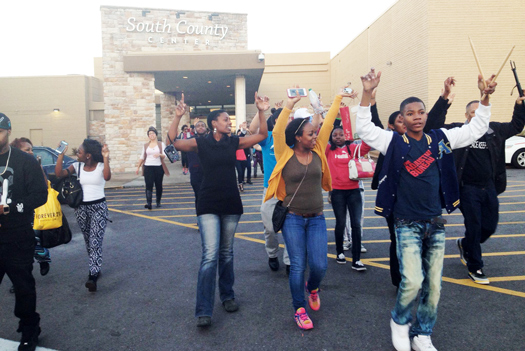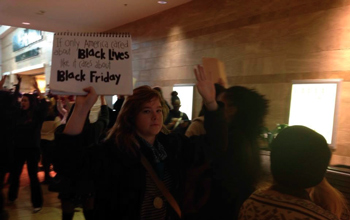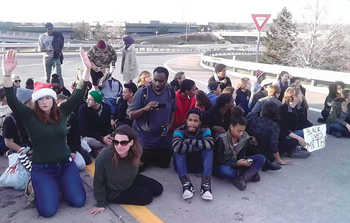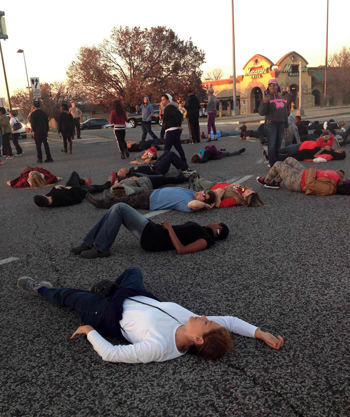Economic power in the fight for justice beyond the holidays
By Starla Muhammad -Assistant Editor- | Last updated: Dec 29, 2014 - 9:39:55 AMWhat's your opinion on this article?

Protestors walk out of mall after shutting down stores in efforts to inflict economic pain as part of strategies to obtain justice.
|
No more business as usual!
Excess spending and frivolity is historically associated with the U.S. holiday season but this year marks a change in direction and focus from consumerism to commitment by those refusing to adhere to business as usual.
Nationwide, activists and ordinary citizens are calling for continued spending boycotts of large retail outlets and many are encouraging Black people to instead increase spending money at Black-owned businesses.
This strategy has gained momentum in recent months as one response to several police and vigilante involved shootings and abuses of young, Black men and women that have gripped the country.

Demonstrators took to St. Louis-area shopping malls to shutdown stores as part of protests and demands for justice for the killing of unarmed Black teenager Mike Brown in Ferguson, Mo. Photos: Richard B. Muhammad
|
Black spending power used strategically is a critical force in the struggle for Black freedom, justice and equality, activists point out.
“This must be a multi-front movement in which we use every possible strategy and tool available to us. That undoubtedly includes economic boycotts, which are a form of fiscal resistance,” responded Rahiel Tesfamariam, writer, social activist and founder of Urban Cusp magazine to an e-mail from The Final Call.
“With the $1.1 trillion buying power of the African American community, it is absolutely necessary to withhold our hard earned earnings from a broken system that often values property over people. It is a way for us to assert that we have had enough and will spend ‘not one dime.’ We refuse to be driven by America’s rampant materialism and capitalistic values at a time of communal grief and rage,” said Ms. Tesfamariam.
According to various reports, there was an 11 percent drop in Black Friday sales this year to $50.9 billion from an estimated $57.4 billion in 2013. While analysts are not attributing the decline to boycott’s by thousands still angry and outraged by the deaths of Michael Brown Jr., 18, Eric Gardner, 43, Tamir Rice, 12, Tanisha Anderson, 37, John Crawford, 22, Akai Gurley, 28 and countless others at the hands of police, others argued it did have an impact.

Activists say efforts to shutdown highways near shopping malls are part of ongoing efforts to use economic boycotts as a tool to help obtain social and racial justice. Photos: Richard B. Muhammad
|
Ms. Tesfamariam agreed; stating the economic boycott led by young Black men and women in response to the Ferguson decision not to indict Officer Darren Wilson in the shooting death of Michael Brown Jr., played a major role in this year’s decline. “Not One Dime” was another online hashtag that garnered tremendous grassroots support.
“The boycott galvanized through social media started out as an online grassroots effort but caught the attention of countless African American celebrities who backed it by promoting to their millions of followers. Our collective efforts were a tremendous display of solidarity and resistance by a community that is fed up with racial profiling and the systemic devaluation of Black life,” said Ms. Tesfamariam.
Supporters of the push to direct Black spending habits to Black-owned businesses note the potential impact it could have on effectively addressing problems of high crime, poor education, lack of jobs and health disparities that plague poor, Black and Brown communities.
In a recent commentary, “We Need to Use Our Black Economic Power,” psychologist Dr. Jawanza Kunjufu raised a series of questions.
“How can a group have over 3 million people with college degrees be so under-developed economically? How can a people have over 10,000 elected officials have so little economic power? Why do African Americans only spend 3 percent of their income with each other?” he asked. “Could that explain why only 9 out of every one thousand African Americans start a business, while other groups are above 100? Or could it be that Black parents socialize their children to get a good education, or to get a good job, while other groups encourage their children to become entrepreneurs?” continued Dr. Kunjufu.
Boycotts are a start but cannot be the end result. It must be ongoing, noted Ms. Tesfamariam.

Demonstrators stage die-in as part of Black Friday protests that led to a drop in spending for the important weekend.
|
“This includes but is not limited to supporting Black-owned business and causes, as I have called for through the #BlackDecember campaign. Black-owned banks and financial institutions play a major role in this, as where our money is housed matters just as much as where it is spent,” said Ms. Tesfamariam.
Black communities also must begin to understand the need for its community to explore greater job creation and small business empowerment, because self-determination and self-sustainability are critical to any strategy for economic empowerment, she continued. “I and other activists engaged on this front know how critical it is to shift the mindset of our community in order to build fertile ground for this strategy to be sustained on a long-term basis.”
A catalyst for change
Black people advocating for unity through the pooling of economic resources, boycotts or direct and strategic targeting of finances is not a new strategy. From Marcus Garvey to the Honorable Elijah Muhammad, patriarch of the Nation of Islam, Black people pooling money and working together to better their circumstances has been a constant throughout history.
The 1955 Montgomery Bus Boycott in Alabama is being cited by several young activists and bloggers as a model and inspiration on how to use economic leverage and unity to influence systematic change. If retail sales continue to decrease into 2015 as a result of boycotts, it could then force those that make policy to enact legislative changes even in the justice system, noted one blogger.
The time has come to revisit the strategy of long-term economic boycotting to create ongoing pressure on the justice system, whose institutional racism impacts all people of color, Mai Perkins wrote in an online commentary titled, “No Justice, No PROFITS.” Ms. Perkins noted that the Montgomery Bus Boycott lasted over a year by setting up systems within the Black community that were driving forces in sustaining the boycott. The same thing is needed today, she said.
“One-day or even short-term boycotts cannot achieve the type of change people are desperate for, which in this case is to repeal policies and laws regarding police misconduct and accountability. I imagine that big corporations have the influence to lobby for social justice initiatives that benefit the very same consumers who are spending money on their products and services,” wrote Ms. Perkins.
The Nation of Islam under the guidance of Mr. Muhammad in the 1960s and 1970s and under the leadership today of the Honorable Minister Louis Farrakhan, has demonstrated success in establishing businesses, farms, schools and programs in Black communities.
At a recent address to college students at Morgan State University in Baltimore, Md., the Minister voiced his strong stance on Blacks not spending money with their “open enemy.” The Muslim leader voiced his support for the Black Friday boycott. But the long-time leader also has offered a realistic and viable solution to the ills that affect the Black community through Muhammad’s Economic Blueprint. The program calls for 16 million wage earning Blacks to contribute 35 cents per week to a fund, enabling $291.2 million to be accumulated in one year to begin buying farmland, creating industry and making jobs for Black people. The Nation of Islam’s “Do For Self” program has been consistent for over 80 years.
“Politics without economics is symbol without substance,” Min. Farrakhan has often stated.
Charlene Carruthers, national coordinator of the Chicago-based Black Youth Project, said she believes the momentum generated through boycotts and targeted spending will continue into 2015.
Young people, particularly young, Black people are not letting up anytime soon and the movement to divest from some of these corporations that mistreat, do not hire them or invest in the Black community is ongoing, she told The Final Call.
“The effort to divest from these companies and invest more in Black businesses is something that’s going to continue to grow,” said Ms. Carruthers. The use of technology in the dissemination of information is a key component in this growth, she added.
An aspect of community mobilization is ensuring that we know what makes us powerful and how to actualize that power, said Ms. Tesfamariam. “While we are often greater at mobilizing in the streets, we want our community to understand how we stand to benefit from greater economic unity,” she continued. Online campaigns like #NotOneDime and #BlackDecember is her way of beginning to “transform the mentality of the Black community by the renewing of the mind.”
“When you couple that with the efforts on the ground to literally ‘shut it (access to retail shopping) down,’ then there is a disruptive force at work that won’t allow us to conduct business as usual.”
INSIDE STORIES AND REVIEWS
-
-
About Harriett ... and the Negro Hollywood Road Show
By Rabiah Muhammad, Guest Columnist » Full Story -
Skepticism greets Jay-Z, NFL talk of inspiring change
By Bryan 18X Crawford and Richard B. Muhammad The Final Call Newspaper @TheFinalCall » Full Story -
The painful problem of Black girls and suicide
By Charlene Muhammad -National Correspondent- » Full Story -
Exploitation of Innocence - Report: Perceptions, policies hurting Black girls
By Charlene Muhammad -National Correspondent- » Full Story -
Big Ballin: Big ideas fuel a father’s Big Baller Brand and brash business sense
By Bryan Crawford -Contributing Writer- » Full Story






 Click Here Stay Connected!
Click Here Stay Connected!








